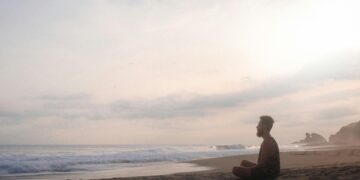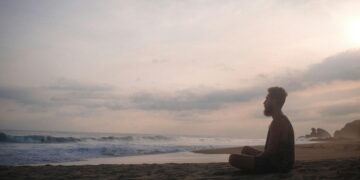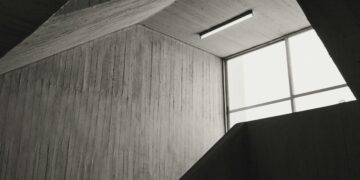Table of Contents
For over two decades, my life was built on the bedrock of a specific kind of faith.
I’m Alex, and I was a Christian.
This wasn’t a casual, holidays-only affiliation; it was the language I spoke, the community that held me, and the moral map by which I navigated the world.1
It was a worldview built around a benevolent, personal, and interventionist God.
And for a long time, that structure felt solid.
But over the years, a quiet hum of dissonance began, a growing tension between the tidy blueprint of my beliefs and the messy, beautiful, and often tragic reality of the world I lived in.
That hum became a roar I could no longer ignore.
The breaking point wasn’t a philosophical debate or a passage of scripture.
It was the slow, seven-year twilight of my grandfather’s mind as Alzheimer’s disease dismantled him piece by piece.
I prayed with the desperate fervor only a true believer can muster.
I pleaded with the God I knew—the one who supposedly numbered the hairs on our heads and intervened in human affairs—for a miracle, for a reprieve, for a moment of clarity for the man who had taught me so much.
I was met with a profound and unshakable silence.
That silence didn’t just bring grief; it fractured the very foundation of my faith.
It forced the abstract “problem of evil” out of the textbook and into my living room, presenting it not as a puzzle to be solved with clever theodicy, but as a raw, lived trauma.3
The standard answers—that God’s ways are mysterious, that this was part of a divine plan—felt not just inadequate, but hollow.
My experience simply did not align with the story I had been told about the world.5
I was left with a choice: abandon my own reason and senses, or begin the terrifying work of questioning the blueprint itself.
Part I: The Unraveling of a Clockwork God
When the Blueprint Doesn’t Match the Building
My journey away from the faith of my childhood wasn’t a single leap but the slow, structural collapse of an entire worldview.
It began with the emotional crack caused by my grandfather’s suffering, but that crack quickly spread, exposing deep-seated intellectual and moral flaws in the system I had inherited.
The intellectual failures became impossible to ignore.
I had been taught that my faith was rational, but the more I tried to reconcile it with the world, the more its core tenets felt brittle and dogmatic.
I dove deeper into the Bible, not with the comfort of a believer, but with the critical eye of a seeker, and I found a text riddled with internal contradictions and historical inaccuracies.6
I learned about other ancient mythologies and saw undeniable parallels, which undermined the claim that my religion held a unique, revealed truth.
The story of a virgin-born, miracle-working demigod was not exclusive to my tradition.1
It began to feel less like divine revelation and more like a story written by humans, for humans, under the guise of an all-powerful creator.1
This dogma demanded that I “squash uncertainty” and suspend my critical faculties, a price that felt increasingly steep.7
The conflict with science was another major point of friction.
It wasn’t just about specific clashes like creationism versus evolution 8; it was a fundamental incompatibility between two ways of knowing.
Religion presented a fixed, ancient truth revealed once and for all, while science offered a dynamic, provisional understanding of the world, constantly updated with new evidence.9
One was static; the other was alive.
This intellectual dissonance was matched by a growing moral horror.
I could no longer rationalize doctrines like eternal damnation for non-believers.
The idea that billions of good, loving people—including some I knew personally—were condemned to infinite suffering simply because of the “geographic lottery” of their birth felt monstrously unjust.6
The concept of a God who demanded obedience motivated by fear of punishment, rather than inspiring compassion from within, struck me as ethically impoverished.8
As Albert Einstein noted, “Man would indeed be in a poor way if he had to be restrained by fear of punishment and hopes of reward after death”.11
What I came to understand is that deconstruction is rarely about a single issue.
It’s a cascade failure.
A traditional religious worldview is often presented as a perfectly interlocking system: the Bible is God’s inerrant word, God is perfectly good, and the church is His ordained authority.
But when one powerful piece of counter-evidence—like the senseless, prolonged suffering of a loved one—challenges the “perfectly good” premise, it places unbearable stress on the entire structure.
The system’s defense often involves appeals to a mystery that reason cannot penetrate, which weakens the pillar of rationality.
When reason is sidelined, you begin to see the Bible not as an inerrant divine text but as a human artifact, with all its flaws and contradictions.
And once the nature of God and the authority of the text are in doubt, the authority of the institution built upon them crumbles.
My departure from faith wasn’t a simple choice; it was the inevitable collapse of a flawed cognitive and emotional architecture.5
Part II: Navigating the In-Between
Charting the Wilderness: Atheism, Agnosticism, and the SBNR Label
Leaving the rigid structure of my former faith was both liberating and terrifying.
I was adrift in a sea of questions, stripped of the identity that had defined me for so long.
Like many who leave organized religion, I began a search for a new label, a new map to make sense of my place in the world.12
I first explored atheism.
Intellectually, it was a clean break.
I agreed with its rejection of a personal, supernatural God and its firm grounding in reason and evidence.13
It provided a powerful “no” to the propositions I could no longer accept.
Yet, it felt incomplete.
For me, it was a destination defined by what it lacked.
It didn’t account for the profound sense of awe I still felt when contemplating the cosmos, the deep feeling of connection that arose during a walk in an old-growth forest, or the persistent intuition that there was
something more than just matter in motion.
This feeling is common among those who eventually find their way to more nature-centric spiritualities.14
While the pejorative term “sexed-up atheism” is sometimes leveled at pantheism, it points to a real desire for a worldview that combines rational naturalism with a sense of the poetic and the sacred.15
Next, I considered agnosticism.
This felt like the most intellectually honest position.
It is the simple, humble admission that the ultimate nature of reality—specifically the existence of a God—is fundamentally unknowable or unprovable.17
As an epistemological stance, it’s sound.
But as a life philosophy, it felt like a waiting room.
It described what I
didn’t know, but it offered no framework for structuring what I did feel and experience.
It was a suspension of judgment, not a generative worldview.19
That’s when I stumbled upon the label that, for a time, felt like home: “Spiritual But Not Religious” (SBNR).
I soon learned I was far from alone.
This is a massive and rapidly growing demographic, with studies showing that over a fifth of Americans identify this Way.20
The SBNR profile fit me perfectly: a belief in a “higher power or spiritual force” rather than a personal, biblical God (a view held by 73% of SBNRs); a deep sense of connection to nature; and a preference for personal, experiential spirituality over public ritual and dogma.20
But the SBNR identity presented its own dilemma.
It was a perfect description of a feeling, but it wasn’t a coherent philosophy.
It was a collection of intuitions—awe, interconnectedness, a sense of purpose—without an underlying, unifying structure.
Critics sometimes dismiss the SBNR stance as “cherry-picking” palatable beliefs without the responsibilities of a tradition.23
While I reject the condescending tone, I recognize the kernel of truth in the critique: it often lacks a robust, defensible framework.
It’s a symptom of a search, not the destination itself.
This widespread phenomenon isn’t just a sign of religious decline; it’s a powerful signal of a deep, unmet need.
Millions of people have deconstructed the old systems but have not been offered a compelling, coherent new one.
They have rejected the “product” of organized religion but still feel the “need” for spirituality, purpose, and connection.
They are assembling their own worldviews from scratch because the available off-the-shelf options don’t quite fit.23
This spiritual vacuum is where my journey took its most important turn—not toward adopting an existing label, but toward discovering a new one.
To clarify the landscape I was navigating, I found it helpful to map out the primary options.
Table 1: A Comparative Framework of Non-Theistic and Related Beliefs
| Feature | Theism (Classical) | Deism | Pantheism | Agnosticism |
| Nature of Higher Power | A personal, transcendent, and immanent God, distinct from creation. | A transcendent creator God, separate from the universe.24 | An immanent divine reality; the universe itself is God.15 | The existence or nature of a higher power is unknowable.18 |
| Divine Intervention | God actively intervenes through miracles, prayer, and revelation. | God does not intervene after the initial act of creation.27 | “Intervention” is nonsensical; God is the process of the universe. | The question of intervention is unanswerable. |
| Source of Knowledge | Divine revelation (scripture, prophets) and reason. | Reason and observation of the natural world exclusively.27 | Reason, intuition, and experience of the interconnected universe.28 | Human reason is insufficient to attain this knowledge.29 |
| Role of Humanity | To worship, obey, and have a relationship with God. | To live virtuously according to reason and natural law.30 | To realize one’s identity as part of the divine whole; participation.14 | To suspend judgment and live based on available evidence. |
| Core Analogy | The King and His Kingdom | The Watchmaker and the Clock 25 | The Ocean and its Waves | The Locked Box |
Part III: The Epiphany and the New Paradigm
The Biologist’s Lens: My Epiphany in Systems Theory
My breakthrough didn’t come from a dusty tome of philosophy or theology.
It came from the world of biology and ecology.
While reading about systems theory, I was struck by the concept of emergence—the way complex, intelligent, and seemingly purposeful behaviors arise from the simple interactions of individual components, all without a central commander or external designer.31
Think of an ant colony, which exhibits incredible collective intelligence, or the phenomenon of consciousness, which emerges from the interactions of billions of non-conscious neurons.
An ecosystem maintains a delicate, resilient balance through a web of countless feedback loops between organisms and their environment.32
Suddenly, everything clicked into place.
The universe, I realized, could be understood not as a machine that was built, but as a living system that grew.
This was the epiphany.
The “higher power” I had always sensed wasn’t an external agent who created the system, like the Deist’s absentee watchmaker.25
It was an
emergent property of the system itself.
It was the creativity, the self-organization, the pattern-that-connects, inherent in the very fabric of reality.
The universe wasn’t a static clock, ticking away according to fixed laws set by a distant creator.
It was a complex, adaptive, learning system—more like a vast ecosystem, a developing brain, or a growing organism.
This new analogy didn’t just offer an alternative; it reframed the entire question and dissolved the problems that had plagued my old worldview.
The Living Systems Paradigm: A New Framework for Spirituality
This “Living Systems” paradigm provided the coherent framework that my SBNR intuitions had been searching for.
It rests on three core pillars that redefine our understanding of a higher power, our relationship to it, and our way of living in the world.
Pillar 1: The Nature of the Higher Power — Emergence over Design
This pillar redefines “God” or “higher power.” It is not a being, but a process.
It is the emergent, creative, and self-organizing intelligence of the cosmos as a whole.
This view synthesizes the most compelling aspects of other non-theistic beliefs.
It embraces the immanence of Pantheism—the idea that the divine is found within the universe, not outside of it.26
But it also incorporates a form of transcendence, much like Panentheism, by recognizing that the whole system exhibits properties that are greater than the sum of its individual parts.24
A beautiful way to grasp this is through the ancient metaphor of musica universalis, or the “music of the spheres”.34
In the old theistic model, God is the Composer who writes the score.
In the Deist model, God is the composer who wrote the score long ago and left the concert hall.
In a simple Pantheist model, God
is the orchestra’s instruments.
But in the Living Systems paradigm, the higher power is the harmony itself—the beautiful, complex, and ever-evolving music that emerges from all the individual notes being played in relationship to one another.
The universe is a symphony in progress, and its divinity lies in its song.
Pillar 2: Our Relationship to the Higher Power — Participation over Worship
If the universe is a living system, our role within it changes dramatically.
We are not subjects of a king, required to offer worship and supplication.
We are nodes in a network, cells in an organism.
Our relationship, therefore, is not one of obedience, but of participation and attunement.
This reframing provides a powerful philosophical backbone for the practices that many SBNRs are already intuitively drawn to.22
The deep spiritual peace felt in nature is no longer just a pleasant emotion; it is a moment of heightened awareness of our profound embeddedness in the planetary ecosystem.
Meditation and centering practices are not petitions to an external being, but methods of quieting the ego’s noise to better sense our connection to the larger whole.
Awe and wonder are not just reactions to beauty; they are the recognition of the system’s staggering complexity and creativity.
In this model, “worship” is transformed into acts of reverence for the system itself: creating art, building deep and authentic relationships, working to protect the natural world, and expanding our own understanding through science and learning.
Pillar 3: Our Way of Living — Systemic Health over Divine Command
This final pillar offers a new foundation for morality and purpose, directly resolving the crisis that began my journey.
First, it redefines morality.
In the absence of a divine lawgiver, where do ethics come from? The Living Systems paradigm suggests that morality is not a set of revealed rules, but a function of systemic health.
Ethical actions are those that contribute to the health, resilience, stability, and flourishing of the interconnected systems we are a part of—our families, our societies, our biosphere.
Unethical actions are those that degrade, destabilize, or cause harm within these systems.
This provides a robust, non-theistic, and non-relative foundation for morality rooted in empathy, reason, and an understanding of consequences.11
It also dissolves the classic “problem of evil.” “Evil” is no longer a metaphysical force to be explained away by a good God; it is a measure of systemic dysfunction, suffering, or harm.
And as conscious participants in the system, we have an inherent responsibility to work to mitigate that harm and increase the system’s overall health.
Second, it redefines purpose.
My old faith taught me that my purpose was assigned to me by my Creator.
When I lost that faith, I felt a profound loss of purpose.2
The Systems paradigm reveals that purpose is not assigned from the outside; it is
emergent from the inside.
We create our purpose by discovering our unique, valuable function within the whole.
It is found in the application of our talents, the pursuit of our passions, the quality of our relationships, and the contribution we make to the communities and ecosystems we inhabit.37
This is an incredibly empowering shift, moving us from being passive recipients of a pre-ordained mission to being active, creative architects of a meaningful life.
This new framework succeeds where others fall short because it resolves the core tensions that leave so many spiritual seekers unsatisfied.
It bridges the gap between the perceived sterility of atheism and the unscientific nature of some spiritual beliefs by grounding feelings of awe and reverence in the scientific concept of emergence.
It avoids the dilemma of a meddling theistic God or an absent Deist God by positing a divinity that is neither an agent nor remote, but is the ever-present, underlying process of reality itself.
And it establishes a clear basis for morality and purpose that requires neither a supernatural commander nor a descent into pure subjectivism.
It is, in short, the coherent, integrated spiritual operating system that the SBNR world has been searching for.
Part IV: Living Within the System
From Orphan of God to Participant in the Cosmos
My journey began with the collapse of a clockwork universe and the death of its Watchmaker God.
I felt like an orphan, adrift in a cosmos that had suddenly become silent and meaningless.
The Living Systems paradigm changed everything.
It didn’t give me back my old God, but it gave me something far more profound: a sense of my place within a living, breathing, evolving cosmos.
The silence I once perceived as absence, I now understand as the quiet, intricate hum of a system at work.
This framework is not another rigid set of beliefs to be accepted without question.
It is a lens, a new way of seeing.
It is built on three foundational shifts in perspective:
- A Higher Power of Emergence: We look for divinity not in a supernatural being outside the universe, but in the creative, self-organizing, and intelligent patterns that emerge from within it.
- A Relationship of Participation: We relate to this power not through supplication, but through conscious and responsible participation—as integral parts of a greater whole.
- A Life of Systemic Health: We find our moral compass and our life’s purpose not in a divine rulebook, but in the joyful, challenging work of contributing to the health and flourishing of the systems we are a part of.
This path can feel lonely, especially when leaving behind the built-in community of organized religion.
But you are not alone.
A growing number of secular and non-religious communities are forming, both online and in person, creating spaces for connection, support, and shared exploration for people on this very journey.39
The final invitation of this paradigm is not to adopt a new dogma, but to embrace a new practice of living.
It is a call to live with boundless curiosity, to see the world with the eyes of a scientist and the heart of a poet.
It is a call to connect—deeply and authentically—with the human and natural systems that sustain us.
And it is a call to embrace the awesome responsibility and profound joy of being a conscious participant in the grand, unfolding story of our living universe.
Works cited
- What is your story of leaving Christianity? – Quora, accessed August 11, 2025, https://www.quora.com/What-is-your-story-of-leaving-Christianity
- From Holy To Heretic | Why I Left Christianity – YouTube, accessed August 11, 2025, https://m.youtube.com/watch?v=qaOkoJeDG-s&t=0s
- Evidential Problem of Evil, The | Internet Encyclopedia of Philosophy, accessed August 11, 2025, https://iep.utm.edu/evil-evi/
- Logical Problem of Evil | Internet Encyclopedia of Philosophy, accessed August 11, 2025, https://iep.utm.edu/evil-log/
- Why People Quit Religion—and How They Find Meaning Again, accessed August 11, 2025, https://greatergood.berkeley.edu/article/item/why_people_quit_religion_and_how_they_find_meaning_again
- What Made You Leave Christianity? : r/exchristian – Reddit, accessed August 11, 2025, https://www.reddit.com/r/exchristian/comments/12lb5n1/what_made_you_leave_christianity/
- Religion Contra Dogma – Garrett Kincaid, accessed August 11, 2025, https://garrettkincaid.com/blog/religion-contra-dogma
- Criticism of religion – Wikipedia, accessed August 11, 2025, https://en.wikipedia.org/wiki/Criticism_of_religion
- On the Intersection of Science and Religion | The Pew Charitable Trusts, accessed August 11, 2025, https://www.pew.org/en/trend/archive/winter-2021/on-the-intersection-of-science-and-religion
- Is the War Between Science and Religion Over? – American Humanist Association, accessed August 11, 2025, https://americanhumanist.org/what-is-humanism/war-science-religion/
- Secular morality – Wikipedia, accessed August 11, 2025, https://en.wikipedia.org/wiki/Secular_morality
- Spiritual Struggles of Nones and ‘Spiritual but Not Religious’ (SBNRs) – MDPI, accessed August 11, 2025, https://www.mdpi.com/2077-1444/11/10/513
- Is there really any practical difference between a deist and an atheist? – Quora, accessed August 11, 2025, https://www.quora.com/Is-there-really-any-practical-difference-between-a-deist-and-an-atheist
- Why I am a Pantheist – World Pantheism, accessed August 11, 2025, https://pantheism.net/voices/short/
- What are the differences with deism? : r/pantheism – Reddit, accessed August 11, 2025, https://www.reddit.com/r/pantheism/comments/1bv9qup/what_are_the_differences_with_deism/
- What is the difference between pandeism (pantheist deism) and agnostic theism? – Quora, accessed August 11, 2025, https://www.quora.com/What-is-the-difference-between-pandeism-pantheist-deism-and-agnostic-theism
- www.ebsco.com, accessed August 11, 2025, https://www.ebsco.com/research-starters/religion-and-philosophy/agnosticism#:~:text=Agnosticism%20is%20a%20philosophical%20position,%22knowledge%22%20(gnosis).
- Agnosticism – Wikipedia, accessed August 11, 2025, https://en.wikipedia.org/wiki/Agnosticism
- Atheism and Agnosticism (Stanford Encyclopedia of Philosophy), accessed August 11, 2025, https://plato.stanford.edu/entries/atheism-agnosticism/
- Who are ‘spiritual but not religious’ Americans? | Pew Research Center, accessed August 11, 2025, https://www.pewresearch.org/religion/2023/12/07/who-are-spiritual-but-not-religious-americans/
- Spiritual but not religious – Wikipedia, accessed August 11, 2025, https://en.wikipedia.org/wiki/Spiritual_but_not_religious
- Meet the “Spiritual but Not Religious” – Barna Group, accessed August 11, 2025, https://www.barna.com/research/meet-spiritual-not-religious/
- “Spiritual but not Religious” | The Pluralism Project, accessed August 11, 2025, https://pluralism.org/spiritual-but-not-religious
- Four main beliefs about the nature of God: Deism, Panentheism, Pantheism & Theism, accessed August 11, 2025, https://www.theosophical.org/files/events/MahatmaLetters/About_God.pdf
- Deism | EBSCO Research Starters, accessed August 11, 2025, https://www.ebsco.com/research-starters/history/deism
- Pantheism – Wikipedia, accessed August 11, 2025, https://en.wikipedia.org/wiki/Pantheism
- Deism – Wikipedia, accessed August 11, 2025, https://en.wikipedia.org/wiki/Deism
- What is Pantheism? – Universal Pantheist Society, accessed August 11, 2025, https://www.pantheist.net/what-is-pantheism.html
- Agnosticism – Routledge Encyclopedia of Philosophy, accessed August 11, 2025, https://www.rep.routledge.com/articles/thematic/agnosticism/v-1
- What Is Deism? – Ways to Learn at Ligonier.org, accessed August 11, 2025, https://learn.ligonier.org/articles/field-guide-on-false-teaching-deism
- The Best of Both Worldviews: Can Systems Theory Unite Spirituality and Science?, accessed August 11, 2025, https://www.mindthatego.com/systems-theory-worldviews/
- Systems thinking, spirituality and Ken Wilber – Journal.fi, accessed August 11, 2025, https://journal.fi/ar/article/view/67570/27866
- Pantheism | Definition, Beliefs, History, & Facts – Britannica, accessed August 11, 2025, https://www.britannica.com/topic/pantheism
- Musica universalis – Wikipedia, accessed August 11, 2025, https://en.wikipedia.org/wiki/Musica_universalis
- 4 Ways to Create Meaning in Life Without Religion – The Emotion Machine, accessed August 11, 2025, https://www.theemotionmachine.com/4-ways-to-create-meaning-in-life-without-religion/
- Ethics Without Gods – American Atheists, accessed August 11, 2025, https://www.atheists.org/activism/resources/ethics-without-gods/
- Finding Purpose and Morality Without Belief in God or an Afterlife – Steinsworth™ LLC, accessed August 11, 2025, https://steinsworth.com/finding-purpose-and-morality-without-belief-in-god-or-an-afterlife/
- How do you find purpose without religion? : r/atheism – Reddit, accessed August 11, 2025, https://www.reddit.com/r/atheism/comments/2fu6c7/how_do_you_find_purpose_without_religion/
- Center for Non-Religious Spirituality, accessed August 11, 2025, https://nonreligiousspirituality.com/
- Sunday Assembly, accessed August 11, 2025, https://www.sundayassembly.org/
- Local Faith and Non-Religious Communities | Harvard Divinity School, accessed August 11, 2025, https://www.hds.harvard.edu/community-life/religious-spiritual-life/local-faith-and-nonreligious-communities
- Resources for Local Secular Communities, accessed August 11, 2025, https://secular.org/resources-for-local-secular-communities/






